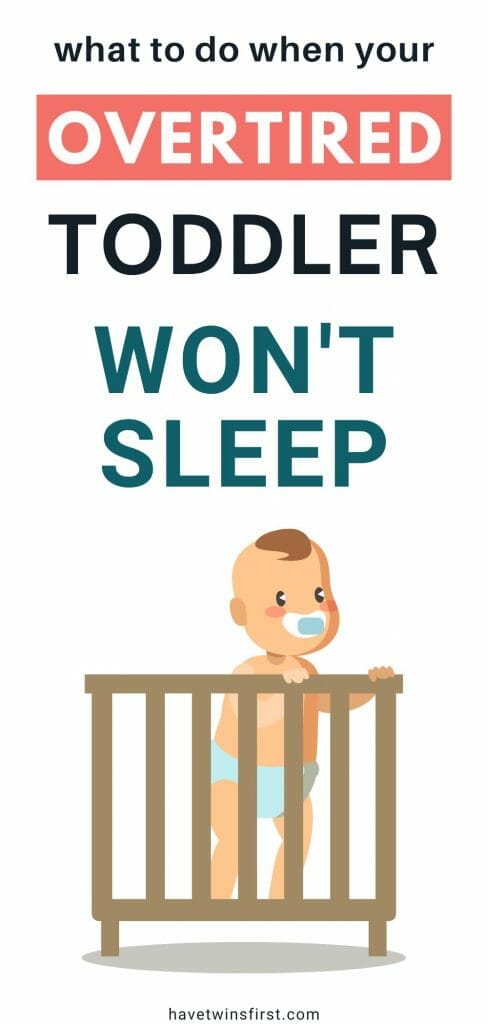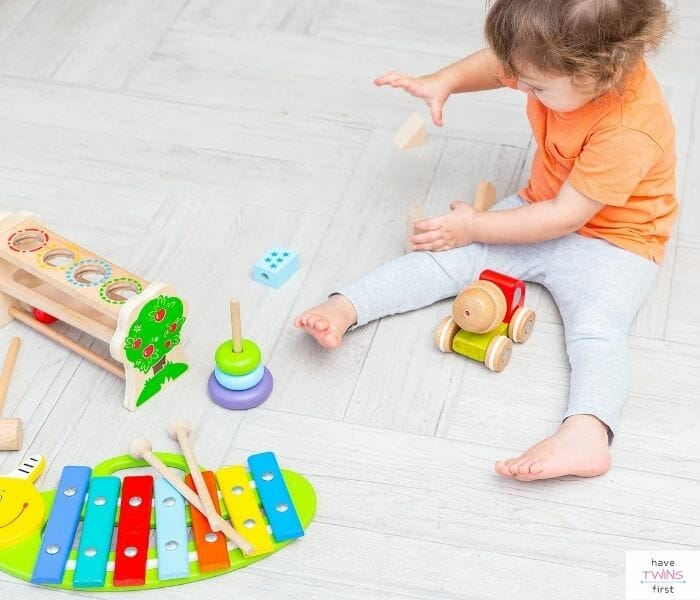As a parent you know that dealing with a toddler can be challenging, but dealing with an overtired toddler is a whole new level of difficulty. When your little one won’t sleep or stop crying, it is beyond frustrating. However, there are steps you can take to help calm your toddler and get him or her to sleep.
As a mom of 3, including twins, I have had to deal with overtired toddlers many times. It’s stressful and exhausting for everyone involved. That’s why I’m sharing the things that worked in my household to get back on track to good sleeping habits.
With the right approach, you can get an overtired toddler who won’t sleep to feel more rested, relaxed, and on track to good sleeping habits. So, let’s review how to recognize toddler overtiredness and what to do about.
Please note, there are affiliate links in this post. Read my privacy & disclosure policy at the bottom of this page to learn more.
Why Does Overtiredness Make a Toddler Not Sleep?
Overtiredness is when someone is experiencing an excessive amount of exhaustion due to a number of factors, which can include lack of sleep due to illness or physical exertion. This is definitely a common occurrence when it comes to toddlers. Unfortunately though, overtiredness in toddlers can be extremely challenging to deal with.
An overtired toddler will be irritable, have mood swings, and struggle to settle down for naps or bedtime. Overtiredness in a toddler can be harmful to their overall well-being. Being able to control it and help your child overcome it is important.
You would think an overtired toddler would drift off to sleep quickly and easily. But no, that is not the case! In fact, overtiredness can greatly enhance a toddler’s inability to fall asleep. Why is this?
The reason overtiredness makes a toddler not sleep is that it causes an over-stimulation of the nervous system. This leads to an increase in the stress hormones cortisol and adrenaline to be released.
When this happens it puts kids almost in flight or fight mode, and it becomes difficult for them to calm down, fall asleep, and stay asleep. Overtiredness results in frequent wake-ups during sleep as well. This in turn causes children to again become overtired. It is a vicious cycle.
Signs a Toddler Is Overtired
There are signs a toddler gives to show that they are overtired. If you are able to pinpoint them, it may make it easier to prevent your toddler from getting to the point of a meltdown later on.
Here are some of the most common signs.
- Difficulty falling asleep
- Irritability
- Decreased concentration
- Physical exhaustion
- Decreased appetite or fussiness with food
- Increased crying
- Struggling to stay asleep
- Delayed development due to chronic lack of sleep
Steps To Help an Overtired Toddler Who Won’t Sleep
Once you have picked up on the signs of an overtired toddler, you will want to start looking at what to do to help your overtired toddler sleep and eventually not be overtired anymore. Below are some steps you can take to tackle this conundrum.
1 – Establish a Schedule & Stick To It
Having a routine, especially a sleep routine, is imperative to combating the overtired toddler challenge. This may take some trial and error, but once you have nailed down your toddler’s ideal schedule, things will be much easier for both you and your toddler.
>>Need help with a typical toddler schedule? Check out this sample schedule<<
2 – Enough Naps
Younger toddlers up to the age of 2 sometimes still need 2 naps a day. On average the transition from 2 naps to 1 nap happens at 14-18 months.
With that in mind, do not force your child to drop their second nap because that’s what the book says or a family member. Do what works for your child and your house.
3 – Make Bedtime Special
Make a big deal of bedtime! And make sure to stick to a bedtime routine at the same time every night.
Having a more structured approach to both bedtime and naptime can make a huge difference when it comes to how well your toddler sleeps.
4 – Adjust As Needed
Kids are tricky and often they need some kind of adjustment when it comes to their daily routines for various reasons. The best advice I can offer is to watch for signs that your child is tired.
The minute they start getting wiggly or cannot focus, start preparing for that nap or bedtime – even if it is 30 or 40 minutes earlier than normal. This will help avoid exhausted toddler meltdowns as much as possible.
How To Get a Toddler To Sleep When Overtired At Bedtime
We have established that overtired toddlers are challenging. Getting them to actually go to sleep when they are overstimulated is extremely stressful for everyone involved. Here we are going to review some strategies you can use to make your toddler’s bedtime routine simple and conducive to going to sleep.
- Have a consistent routine: Do not deviate from this routine. Having a routine that includes a warm bath, calm play time, or reading a book signals that it is now bedtime. Your child will eventually start associating this routine with winding down towards sleep.
- Limit stimulation: Restrict the use of screens at least 1 hour before bedtime. Try not to do anything overly active with your toddler at this time. Keep things quiet and calm as much as possible. Some calming activities you could do include puzzles, coloring, taking a bath, or listening to an audiobook together.
- Have a sleep-friendly environment: Your toddler’s room should be dark, cool, ventilated, quiet and comfortable. Creating this kind of sleep-conducive environment is important to help your child sleep. Nursery blackout curtains or shades and a sound machine are great items for getting your toddler’s room sleep-friendly. I also highly recommend using sleep sacks at this age. If you are looking for a good quality toddler sleep sack, I loved this one.
- Give them a stuffy: Does your child have a comfort toy or item? Make sure it is there waiting in bed. I only recommend this if you have transitioned your child to a toddler bed out of a crib. Never put extra items in the crib.
The biggest strategy, but maybe the most difficult for you as the parent, is to be patient. This is a trying time for all concerned.
The more you stay calm and focused on your goal, the more your toddler will start to mimic your behavior. If you use the strategies discussed, eventually your toddler will overcome his or her overtiredness and start sleeping well.
Toddler Sleep Help
If you are here because you are finding yourself with very difficult toddler sleep struggles, then I have even more additional help that I recommend. If you are stressed, exhausted, and out of ideas to get your toddler sleeping, that is when I recommend getting this Toddler Sleep Course.
The guide was put together by a mom and pediatric sleep consultant. It will teach you how to stop co-sleeping, how to implement quick bedtimes (that does not drag on for hours), what to do when your toddler gets up constantly at night, plus so much more. If you want a quick, simple solution to your toddler’s sleep struggles, get the Toddler Sleep Course now!
What About a Sick & Overtired Toddler That Won’t Sleep?
Having a sick and overtired toddler can be torture for everyone involved. Your child already does not know how to deal with how he is feeling due to illness. Now it is exacerbated by the fact that he is overtired.
A sick child needs sleep. Even when a child is sick, it is important to stick to a routine as much as possible (this can be easier said than done in this case). But, here a list of some ways you can help your sick toddler sleep.
- Give a warm bath – add eucalyptus and lavender oil to soothe, make it more fun with these mold-free Soppycid bath toys too
- Use a humidifier in the bedroom – useful if suffering from a cold or respiratory illness
- Make the bed comfy and inviting
- Keep curtains closed – make sure the room is airy, but also without cold drafts
- Give a gentle massage – your toddler’s little body may just need added comfort while sick in order to drift off to sleep
- Stay with your child
- Give the right medication at the right time
>>Find out if it’s okay to sleep train when your baby or toddler is sick right here<<

What If My Overtired Toddler Wakes Up & Won’t Go Back To Bed?
It might seem inevitable that your overtired toddler will wake up frequently. The best thing you can do is to remain calm and talk very quietly and attentively to your child the entire time.
Ideally, you will comfort your toddler and then return him to his bed. You can stay with your toddler to keep him calm and soothed.
Try putting on some soft music or maybe even read a short story. Do not remove your child from his room and bring him into an over-stimulating environment. That will start the cycle all over again.
If all else fails, you may need to stay with your toddler until he falls asleep completely. Once your toddler is no longer overtired, he will stop waking up.
Now before we move on, I want to mention that sometimes this middle of the night wake up becomes a habit. I have been there and it’s so frustrating.
In this case, I had to redo sleep training using the Ferber method that I had used previously. The good news is that after a couple nights, things were back on track.
How To Handle an Overtired 1-Year-Old Who Won’t Stop Crying
A crying, overtired young toddler is no joke. The key to overcoming the situation is to remain calm. Do not meet your child’s emotions with your own. This will not help. Stay calm and try to calm your toddler at the same time.
Speak in a soothing, reassuring tone. Give your child a cuddle and take him to his room where he sleeps. Make sure your child is aware that you are there and watching, but he needs to sleep now.
Holding, rocking, and providing a pacifier can definitely make a difference here and allow your child to feel safe. It is also important that you rule out any other reasons for excessive crying before heading into the whole sleep routine.
If you are struggling with your toddler’s sleep, hang in there and follow the tips above. It will get better soon.
Toddlers go through so many phases. Implementing strategies and tips that used to work, may not necessarily work in the present time.
The key point to take away from this is to remain consistent. Consistency is key when it comes to growing toddlers and making sure they get the rest they need. They are developing at a rapid pace and need all the sleep they can get.
Finally, if you are finding everything to be a struggle with your toddler and sleep, that is when I recommend this Toddler Sleep Course. Good luck during this challenging time with your toddler, you got this.
More toddler sleep articles that might interest you:






